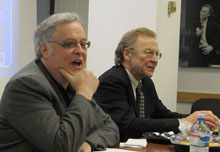
March 30, 2010 — Neal Baer, executive producer of NBC’s Law & Order: Special Victims Unit, spoke at a Shorenstein Center Speaker Series event of the “power of television to promote social change.”
A self-described “confector of stories,” Baer said that he strives to produce television programs that “entertain because they are compelling, not mind-numbing or time-wasting.” Stories that are “full of information” can educate viewers and even drive them to action.
In concert with television, new media such as Twitter, Facebook and mobile phone applications “can be used not only to augment the policy issues portrayed on television but can also serve as new conduits for storytelling,” Baer said. Illustrating his point was a recent episode of Law & Order: SVU that featured a story about rape in the Congo. After the show, viewers publicized the issue through a million Tweets that pointed to various social advocacy groups, articles and websites.
Television is no longer a “shared medium,” Baer explained, and competing with it are myriad sources of information and entertainment. While some people argue that the “nichification” of television (“providing everything under the sun to a small cadre of viewers”) is good for democracy, Baer asserts that “small numbers of viewers watching a disparate array of programs” is “bad for democracy,” because “they’re not learning about pressing issues of our time.”
Despite this, Baer feels that television remains the best place to reach the largest audience. “Social policy issues must be explored on television” without being “preachy or pedantic.” While policy reports can pile up on a policymaker’s desk — important facts and figures buried in oblivion — Baer said that television can take social issues and present them in an emotionally compelling way to “sway public opinion in a way that numbers can’t.”
Baer said that he is constantly searching for ways to “connect social issues with policymakers” and “give viewers concrete ways to get involved.” With accurate, peer-reviewed research and new media outlets, Baer says he’s telling stories that he hopes will effect social change.
This article was written by Janell Sims and the photos taken by Leighton Walter Kille, both of the Shorenstein Center.

